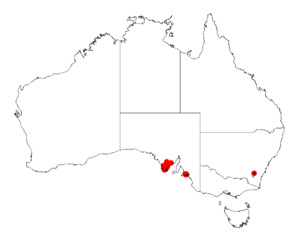Fat-leaved wattle facts for kids
Quick facts for kids Fat-leaved wattle |
|
|---|---|
| Conservation status | |
| Scientific classification | |
| Genus: |
Acacia
|
| Species: |
pinguifolia
|
 |
|
| Where the Fat-leaved wattle grows | |
| Synonyms | |
|
Racosperma pinguifolium (J.M.Black) Pedley |
|
The Fat-leaved wattle (or Fat-leaf wattle) is a special type of plant. Its scientific name is Acacia pinguifolia. This plant only grows in South Australia. It is an endangered species, which means it is at risk of disappearing forever. It belongs to a group of wattles called the Plurinerves section.
What is the Fat-leaved Wattle?
The Fat-leaved wattle is a type of wattle tree. Wattles are also known as acacias. They are very common plants in Australia. This particular wattle gets its name from its leaves. The word pinguifolia comes from Latin words. Pinguis means "fat" and folius means "leaved". So, it literally means "fat-leaved".
Where Does it Grow?
The Fat-leaved wattle is found in specific parts of South Australia. You can find it on the southern Eyre Peninsula. There is also another group of these plants. This group is found near Finniss in the south Lofty region. These two groups are "disjunct," which means they are far apart.
This wattle likes to grow in certain types of soil. It often grows in sandy soil. It can also grow in hard, alkaline soils. Alkaline soils are the opposite of acidic soils. You will usually find it in open scrubland. It also grows in woodland areas.
History of Discovery
The Fat-leaved wattle was first officially described in 1947. A botanist named John McConnell Black described it. Botanists are scientists who study plants. He found a sample of the plant near the Finniss River. This river is close to Lake Alexandrina in South Australia. That's how this unique plant became known to science.


